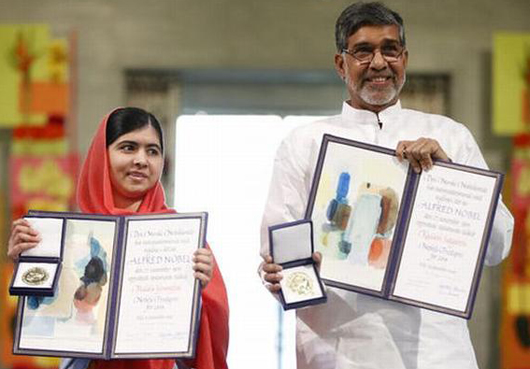Oslo, Dec 10: India's Kailash Satyarthi received the Nobel Peace Prize for 2014 today, sharing it with Pakistan's Malala Yousafzai, the youngest ever Nobel laureate, for their work on promoting child rights in the troubled sub-continent, where millions are deprived of their childhood and education.
"Satyarthi and Yousafzai are precisely the people whom Alfred Nobel in his will calls 'champions of peace'," Chairman of the Norwegian Nobel Committee Thorbjorn Jagland said in his speech before awarding them the prize.

"A young girl and a somewhat older man, one from Pakistan and one from India, one Muslim, the other Hindu; both symbols of what the world needs: more unity. Fraternity between the nations!," he added.
Satyarthi, 60, who gave up his job as an electrical engineer to run an NGO for rescuing children from forced labour and trafficking, and 17-year-old Malala, who survived a near-fatal Taliban attack two years ago with determination advocating education for girls, were named by the Nobel Peace Prize Committee for the prestigious award on October 10.
They received the Nobel medal which is 18 carat green gold plated with 24 carat gold and weighs around 175 grams. They will share USD 1.1 million prize money.
Noting that violence and repression cannot be justified in any religion, Jagland said Islam, Christianity, Judaism, Hinduism and Buddhism protect life and cannot be used to take lives.
"The two whom we honour here today stand very firm on this point. They live according to a principle Mahatma Gandhi gave expression to. He said: 'There are many purposes I would have died for. There are no purposes I would have killed for'," Jagland said, invoking Mahatma Gandhi.
Satyarthi's NGO Bachpan Bachao Andolan (Save Childhood Movement) prides itself on liberating over 80,000 children from bonded labour in factories and workshops across India.
According to the International Labour Organisation (ILO) there are about 168 million child labourers globally. There are roughly 60 million child labourers in India alone.
Malala, who was nominated in the peace prize category last year also, had displayed tremendous courage even after the Taliban attack when she resolutely expressed her determination to carry on with her campaign for child rights and girls education especially in a country like Pakistan.
Speaking after receiving the award, Satyarthi asked audience to feel the child inside them and said the crime against children has no place in a civilised society.
"Children are questioning our inaction and watching our action," he said, adding that all religion teach to take care of children.
Noting that the number of child labour has been reduced by a third, Satyarthi said, "My dream is to make every child free to develop...There is no greater violence than to deny the dreams of children."
Recounting his experience with the unprivileged people, he said, "I am representing the sound of silence of millions of children who are left behind."
"The credit to this honour goes to people who worked and sacrificed for freeing children," he said.
Famed Pakistani singer Rahat Fateh Ali Khan and Indian musician Amjad Ali Khan performed at the award ceremony.
Pakistan's former prime minister Yousuf Raza Gilani was among those present on the occasion.





Comments
Add new comment